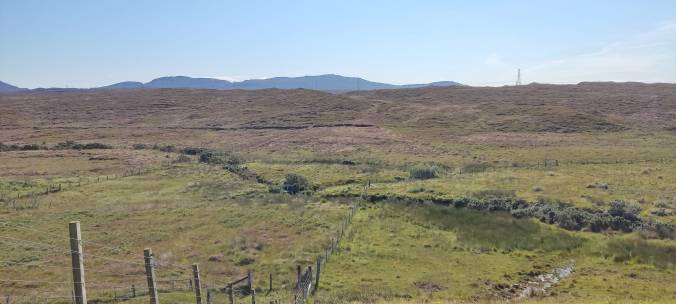“You’re radically collaborative, profoundly empathetic, and deeply communal. Everyone who tells you anything different is selling the fear that is the only thing that can break that nature.” –
This blog post previously appeared in The National as part of Common Weal’s In Common newsletter.
If you’d like to support my work for Common Weal or support me and this blog directly, see my donation policy page here.
 (The wind farm site discussed in this article will interpose between this ridge and the mountains in the background)
(The wind farm site discussed in this article will interpose between this ridge and the mountains in the background)
I was up in Skye this week to give one of my regular talks to activists and campaign groups around Scotland. It’s one of the aspects of my role at Common Weal that I enjoy the most and get the most out of even though it often means a lot of travelling. I’m very grateful to my hosts for not just organising the meeting but also putting me up for the night.
The evening was organised by the Breakish Windfarm Action Group who are currently concerned by plans to build a large windfarm development on a visually prominent part of the island. The estate owner, Lady Lucilla Noble, stands to profit massively from the site as will the Swedish developers Arise while tenant farmers are likely to see their livelihoods disrupted and restricted on what has been up till now land held as Common Grazings. They asked me to give a broader overview of how and why this is happening in Scotland and I duly prepared a presentation based around our proposals for how Scotland can publicly own our energy generation despite the Scottish Government’s excuse that “it’s reserved”. Shortest possible version: It’s only reserved if we want Government Ministers to own the energy. If we allow Local Authorities or communities to own it, it’s perfectly possible. It could even be funded in the same way. The only “downside” is that the Scottish Government wouldn’t get to control it. See Common Weal’s policy paper “How to own Scottish energy” for more details.
What I heard during the night though had both myself and my partner shaking our heads in disbelief. The story in Skye is that a landowner has contracted with a foreign company to extract vast profit from the resources of Scotland over the objections of the local community, without adequately compensating or benefiting said community, while obfuscating the planning process and making it is difficult as possible for the community to “properly” object as processes such as environmental studies and public inquiries cost tens to hundreds of thousands of pounds to complete – trivial amounts for the corporations but far beyond the reach of ordinary people to compete with. Everyone involved fully expects that even if the community is able to punch above its weight in terms of negotiating and bargaining power, Scottish Ministers will just override any objections because the Government’s primary goals are to make the Scottish GDP line go up by means of encouraging “inwards investment” – if doing that pushes climate goals too, then they suppose that’s fine too.
This is precisely the same story that is happening in my village at the moment where a French company is negotiating with a local land owner to build a massive solar farm and battery park. Just about the only thing that differs are the names of some of the people (and even then only some of them because it turns out that Ross Lambie, one of the local councillors for the ward I live in and who sits on our local Planning Committee is an absentee landlord bidding to use some land he owns in Skye to host a temporary housing for the construction workers being shipped in to install the turbines).
We’re not the only two communities facing this. Scotland is awash with largely foreign capital flooding places with applications for developments that even at their best won’t benefit communities nearly as much as they should (the £5,000 per Megawatt of community benefit funding that some of these developments offer is a shadow of the 30 to 100 times as much local revenue retained by full community ownership). Local planning offices report being completely overwhelmed trying to properly scrutinise applications and that goes double for areas with active community councils where volunteer councillors are expected to scrutinise highly technical documents without the resources to do so. Scottish Ministers are far too prone to allow projects to move up to the Energy Consents Unit to ensure that they can make the decisions – overriding local democracy as they do so – but this just concentrates the problem further. The ECU is similarly overwhelmed with more than 4,500 projects having been passed to them since December 2018. An average of almost two new applications per day. Ministers cannot not be expected to properly scrutinise these projects even if this was their only full time job.
And what happens if a dodgy developer does, by chance or fortune, get their application denied or made conditional to the point that they decide the profit margins aren’t high enough? Well, they just resubmit the application and try again or move on to the next community and hope they can’t pay as much attention. Communities need to be lucky every time. Corporations only need to get lucky once.
I’m not against renewable energy as a rule. We need more of it. What I’m asking for is for the Scottish Government to start abiding by its own party-approved policies. We need a Scottish Energy Development Agency (SEDA) to start producing a proper strategic map of Scotland. A map not just of where Scotland’s renewable resources are but where our actual demand is too. The overflow of development without coordination (compounded by frankly idiotic policies from Westminster such as blocking policies like Zonal Pricing) is leading to millions of pounds of consumer’s money being paid to energy generators in constraint payments. Wind turbines already generate profit almost for free once they’re built – the only way to make them more profitable for the multinationals and foreign public energy companies who own them is for them to make the profit without even generating the energy.
In addition to the SEDA we urgently need the Scottish Government to stop its opposition to public ownership of energy and to start allowing Scottish communities to be the owners of these developments.
Communities have been left alone to fight each application individually when it turns out that they are all facing the same spin everywhere. I am very happy to see that communities are increasingly banding together such as the 9CC group in Ayrshire or the recent conference of Community Councils in Inverness, but it’s clear that these groups themselves need support to start talking together, across Local Authority lines. Maybe that’s what it’ll take for Ministers to start paying proper attention. Maybe the next conference has to happen outside Holyrood itself.
The injustice of situations like where I live or in Skye or in hundreds of other communities is going to seriously harm public support for the renewable transition that we need. I’m not against renewable energy. I am against being screwed over by the people who own them. I’m against the injustice of communities not being given a stake in that transition and being told that their voice is irrelevant or a nuisance. But if my experience this week in Skye tells me anything, it’s that communities are ready to make that voice exactly as loud as it needs to be, especially as the elections approach. I hope Ministers will be listening. Or that their replacements might be.










